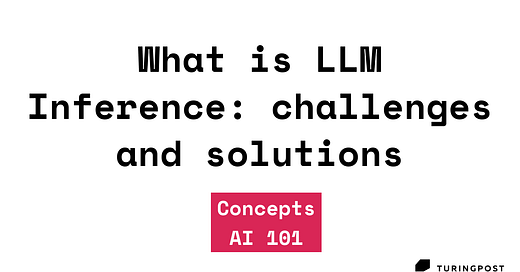Topic 23: What is LLM Inference, it's challenges and solutions for it
Plus a Video Interview with the SwiftKV Authors on Reducing LLM Inference Costs by up to 75%
A trained Large Language Model (LLM) holds immense potential, but inference is what truly activates it – It’s the moment when theory meets practice and the model springs to life – crafting sentences, distilling insights, bridging languages. While much of the focus used to be on training these models, attention has shifted to inference, the phase where they deliver real-world value. This step is what makes LLMs practical and impactful across industries.
In today’s episode, we will cover:
“15 minutes with a researcher” – our new interview series – about SwiftKV, an inference optimization technique
To the basics: What is LLM Inference?
Challenges in LLM Inference
Solutions to Optimize LLM Inference
Model Optimization
Hardware Acceleration
Inference Techniques
Software Optimization
Efficient Attention Mechanisms
Open-Source Projects and Initiatives
Impact on the Future of LLMs
Conclusion
Today, we spoke with Snowflake’s AI Research Team Leads, Yuxiong He and Samyam Rajbhandari (HF profile). Collaborating with their co-authors to reduce inference costs for enterprise-specific tasks, they observed that inputs are often significantly larger than outputs. This is because it’s in the nature of enterprises to analyze enormous amounts of information trying to extract valuable insights, which are much shorter. To address this, they developed SwiftKV, an optimization that reduces LLM inference costs by up to 75% for Meta Llama LLMs, enhancing efficiency and performance in enterprise AI tasks. Today, they are open-sourcing SwiftKV and explaining how it works, its applicability to other architectures, its limitations, and additional methods to further reduce computation costs in inference.
The interview above is for those already tackling inference optimization. If you're wondering what it is, what challenges it presents, and how to optimize LLM inference, the following article is for you.
What is LLM Inference?
At its core, inference is the application of a trained machine learning model to new, unseen data. In the context of LLMs, inference involves taking a user’s input (a prompt) and processing it through the model’s parameters to generate relevant outputs like text, code, or translations.
For example, when you ask an AI assistant a question, the model processes your query token by token, predicting the next likely word or phrase in a sequence based on patterns it learned during training. Unlike training, which is a one-time, resource-intensive process, inference happens repeatedly, often in real-time, as users interact with the model.



